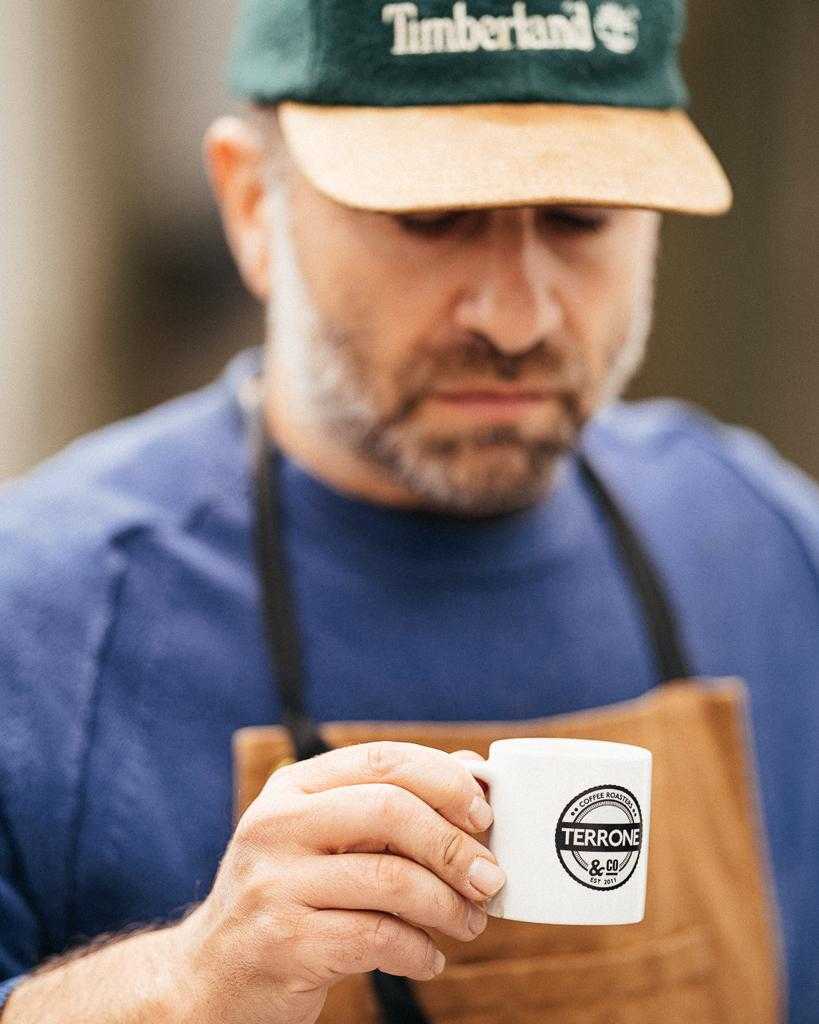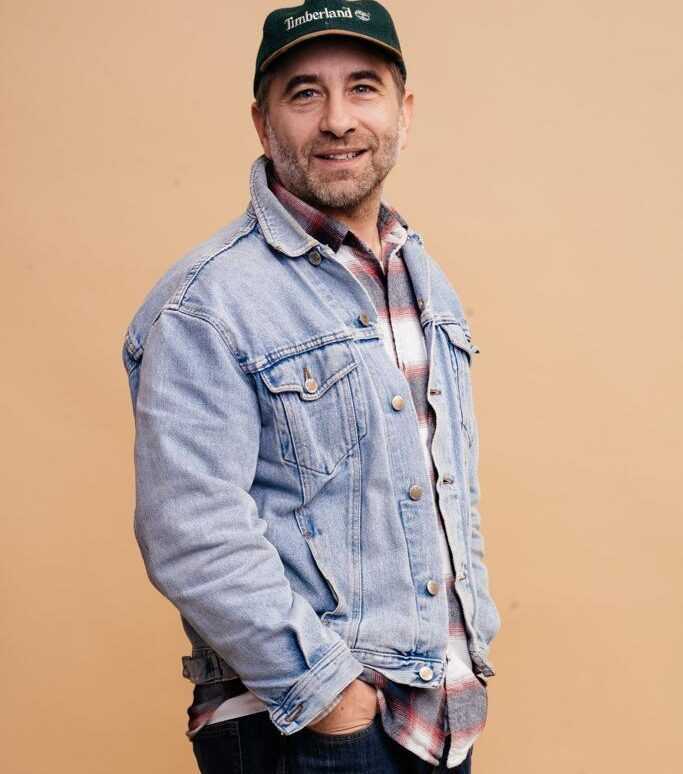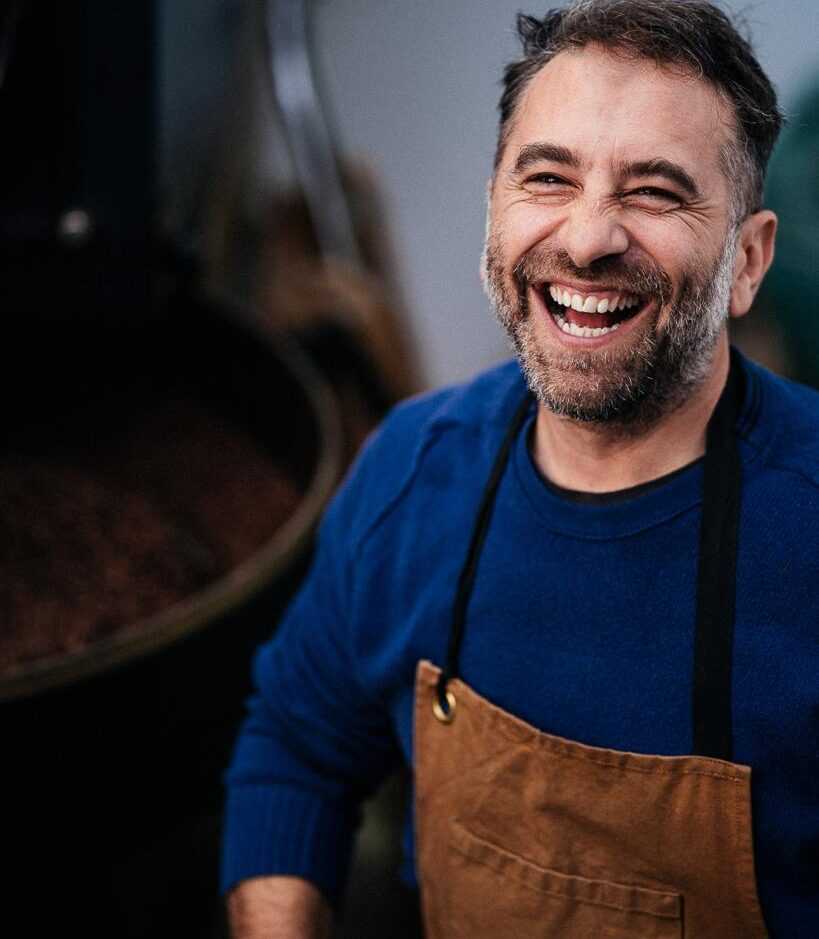MILAN – From Italy to New York and finally to London, Edy Piro‘s journey, which began as a designer and 30 years of experience in digital, has moved in parallel with the world of catering and coffee, refining his taste, training as a hospitality professional and entrepreneur. He is the owner and founder of Terrone & Co., a coffee roasting company based in Tottenham, North London. The creator together with Paolo Petrillo of the pizzeria Farina in Notting Hill Gate , he is also the founder of the coffee shop Farewell together with another partner, which however after 3 years of activity had to face the difficulties of Covid, closing down. But Edy Piro is a pioneer, driven by passion and desire, so there is still a long way to go.
Edy Piro, since 2012 Terrone has wanted to erase the commonplace of dark roasted Italian coffee in blends, with the London specialty: how did this roasting company come about and why outside Italy?
“First of all, I almost never drank coffee in Italy, I always thought of it as a punishment rather than a pleasure, as those who wanted to offer it to me defined it. On those occasions, I preferred to order a pear juice, often ‘offending’ the interlocutor. It was only many years later that I understood why this often astringent and bitter drink was not to my liking.
Since 2002, my work as a designer and architect has taken me first to New York and then to London. Since my first days in California, the first time back in 1991 and then in 2002, I was attracted by the filter drink that was offered in diners with pancake breakfasts (which I am still crazy about).

When I moved from London to Canada and Seattle in 2004, I discovered that this city, also thanks to the success of Starbucks, rightly boasted a great coffee culture: in particular, I was struck by the fact that many coffee bars roasted coffee directly in the back of the shop. At the time, my dream was to open a restaurant, but when I saw the ‘transformation’ of the bean through the roasting process, I realised that it could be a good compromise in food production, and I was much more intrigued than running a classic restaurant.
Edy Piro: “From 2005/6 onwards, I started to learn more about this drink and how it could be dispensed while paying close attention to quality.”
“In the meantime in London there was a diffusion, for a few and very hidden, of coffee roasted specifically for international competitions that made famous people like James Hoffmann (Barista World Champion 2007) and Gwilym Davis (Barista World Champion 2009) together with the birth of (at the time) very small realities like Square Mile Coffee roasters. At that time there were still a handful of people who gravitated towards this reality and the bars that grew out of it. It was more about experimentation than a real culture.
Being the only Italian, I decided to ‘challenge’ this nascent scene by looking for a fellow adventurer who wanted to share the same journey. At a trade fair, I met Simone Meriggi of Perfero Caffè, and with him we began to select and roast various specialities, which are often difficult to find. This collaboration went on until 2019, when for logistical reasons and the approach of Brexit I wanted to move all production to London. We were actually born in Italy but open to the foreign market. And now we are in London, always looking out onto the international stage.”
Your professional experience is linked to the world of design: how did you get into the roasting business? Did you have mentors, did you train with Sca?
“I would like to say that I have never been involved in the roasting process, but I have always managed my own small company, contributing a lot on the communication side, having been a creative in the digital sector for over 20 years. Indeed, especially for the first few years, I was also the delivery man (on a Vespa!) to my customers. Right after office hours, I handled all the logistics.
My mentors in the world of coffee, which was completely new to me, were mostly the people who frequented the very early specialty scene in London: we researched and brought our own experiences from the field. We were trying to modify grinders and make our own tools to extract a roasted coffee in a much more modern way. It was a purely experimental and very exciting phase.
At that time there was almost no Sca presence and we did our own training. Perhaps Gwilym Davis and his Prufrock was the only one offering authorised courses, but frankly I never went down an official route. I never felt the need for it.”
Where do you source your green coffee from? Do you have direct contact with the growers? What is your main market?
“Over the years the supply of green specialties has increased tenfold. At the beginning I remember that there were very few of them and among them, Nordic Approach. But I couldn’t, even with a lot of good will, ship to Italy. Today things have changed and with the roasting plant in London, it is really easy to get access to quality green. The most important direct relationship is with the Barbosa family of the fazenda Cachoeria in Brazil. I love bikes and my mechanic (since 2002) is coincidentally the brother of a girl who works on the plantation. He told me: ‘When you’re roasting here one day, you’ll help my sister carry her coffee’ and so I did. Today I work with them and I was the first to support them to set up distribution in the UK.”
Edy Piro, what is Italian speciality coffee like?
“There has been a big buzz for years now. I remember when I organised the very first Italian Aeropress championships in Milan and all the guys who gravitated around the Italian specialty came to see me: it was like an extended family. There were only a few of us anyway. Today I see many new faces of enthusiasts at competitions and races.
I don’t think there is an “Italian specialty” per se. But I think there is a large group of enthusiasts.
The Italian market does not allow for the same diffusion that has affected countries like England where, for example, there was not such a stratified coffee culture, and it was therefore much easier to share a “new” approach to this drink. Those few who clearly roast high quality beans in Italy do a great job, but unfortunately they are not very popular because of the market and the palate of those who pay 1 euro for espresso. Just think that here in London a specialty cappuccino costs about 5 euros…”
What do you think about the Unesco candidacy of traditional Italian espresso?
“I have a pizzeria and the art of pizza-making was also declared a Unesco heritage site a few years ago. Frankly, I have never seen a tangible benefit from it. We often focus a lot on labels and certificates, but we lose sight of the daily reality that I think would help the sector much more. Italy should roll up its sleeves to stay on the map of international espresso coffee, rather than seeking recognition from Unesco”.
As well as being a coffee expert, Edy Piro is also an entrepreneur in the on-trade: how did you react to Covid with the pizzeria and speciality coffee shop you co-founded?
“Yes, they are connected. As I mentioned before, I always wanted to open a restaurant but the café was a bit of a shortcut. And so, in 2017 I then started with a good friend I met in London, a traditional Neapolitan pizzeria.
Unlike what I had done with the cafe, in this case I wanted to stay true to the Napolitan pizzeria tradition rather than take an approach often referred to as ‘modern’ by some international pizza makers. Simply because it seems to me to be more of a fashion than modernity, and in my opinion, a passing fad.
In any case, the government’s support has helped the businesses directly affected by Covid a lot. The pizzeria had to deal with big problems, especially with the management of the previous premises. With the roasting plant, however, we were able to overcome the critical period thanks to these government incentives. At least until today.”
Around you, how have your fellow managers fared? How is the situation now? Have prices gone up? Are people consuming away from home? Are raw materials arriving?
Edy Piro paints a picture: “In general, there is a lot of cooperation between entrepreneurs here, even from the same sector. Unlike in Italy, here people always think that there is room for everyone and so we help each other a lot, even if we work in the same sector. We’ve all gritted our teeth and rolled up our sleeves, often having to reinvent ourselves from scratch, both in terms of our offer and our management operations. Many people have had to give up, but I think there are more who are coming out of the end with their heads held high and with some scars than those who had to close down.
Let’s say that those who didn’t survive this Covid drubbing were already somewhat doomed. Now (February 2022) things are back to normal and there are many tourists again. People as well as consuming from home have gone back to hanging around the shops.
Brexit has been a big problem both for the lack of raw materials from Italy and for prices, but all in all we are managing to maintain a good supply at the moment. The main problem is specialised labour such as pizza makers who used to be sourced from Italy. Today it’s very difficult, so we’re shifting to in-house training.”
Edy Piro, what can you tell us in more detail about the issue of Italian staff who left for Covid and now cannot return? Do you also have this problem?
“Yes, especially after the summer of 2021, when things were getting back to normal before Omicron. It was a drama. Then with a lot of patience we built up the old pre-covid team, so staff who already had all the right qualifications to work here. Today, it is practically impossible to work here in the catering industry from scratch and coming from Europe. On the one hand there has been a ‘natural selection’ for specific personnel such as a pizza chef with experience behind him. This is a serious problem.
In reality, those who were there and left, if they followed the rules, can now come back and work as before for at least five years. The government has given a lot of possibilities to let those who had already been in the UK before Brexit, even if only for 24 hours, stay before January 1, 2021. The problem is that many Italians have not informed themselves well unfortunately. I often hope to wake up hoping that the Brexit was just a bad dream”.
Why did you decide to invest abroad? Is being a manager in London ‘easier’ than in Italy?

“I had a small creative agency in Italy from 1996 to 2000. We produced websites, CD-Roms and experimented with technologies such as what would later become Google’s “streetview” (but which no one knew about yet). We were pioneers. We applied for new, more powerful computers. We had gone through all the bureaucratic procedures and we had really futuristic projects, which are now, after more than 20 years, the order of the day.
Well: in the rankings, I remember that the funds went to a broom factory and a lift factory of people known in the local business community. It was at that moment that I realised there was no hope for a young company with such broad visions, so I decided to move abroad as soon as I finished my postgraduate exam in Architecture. I never really came back, even though I taught digital art for a few years at the academy of fine arts in Frosinone: it was really unbearable to travel every fortnight from London.
Anyway, I don’t think it’s easier to do business here, but I think it’s extremely difficult and not meritocratic to do it in Italy. For me, normality is what I found abroad. Italy was and is a complicated version of everything, seen from the outside.”
What are your future projects, Covid permitting?
“My vision has always been to stay within a dimension manageable by myself and a small team. I’ve always been fascinated by the possibility of opening several shops and cafés abroad, but in the discussions I’ve had over the years with potential investors, it’s never been a choice I’ve preferred to make. However, it may not happen in the future.
For example, I would always have liked to become a platform for the expansion of any Italian brand that wanted to arrive outside Italy, but it has always been my fantasy rather than a concrete idea. Who knows, maybe in the future.”
















